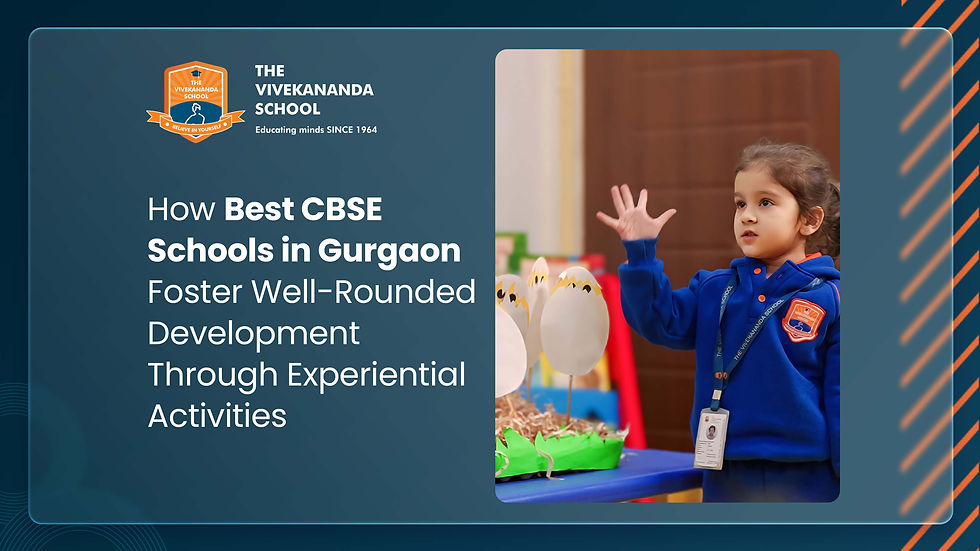Holistic Education vs. Traditional Education: What’s the Difference?
- The Vivekananda School

- Dec 17, 2024
- 4 min read
Updated: Sep 25, 2025

Choosing the right educational path for a child is a significant decision for parents. Today, with evolving educational philosophies, one of the key debates is between holistic and traditional education. The Vivekananda School in Gurgaon, a leader in holistic education, emphasises not just academic excellence but the comprehensive growth of each student, preparing them for life beyond the classroom.
In this blog, we’ll explore the differences between holistic and traditional education and why holistic education is transforming the learning experience at The Vivekananda School.
What is Traditional Education?
Traditional education is typically characterized by a structured curriculum that prioritizes academic achievement. The focus is on core subjects such as math, science, language, and history, often with a fixed teaching method that includes lectures, memorization, and exams. While traditional education has produced scholars and professionals for generations, it sometimes lacks a focus on creativity, critical thinking, and personal growth.
For admissions: Day Care, Playway, Prenursery, Junior KG & Senior KG Call +91 8800902881
What is Holistic Education?
Holistic education, now embraced by top schools in Gurgaon, focuses on the complete growth of a child, not just intellectually but also socially, emotionally, physically, and spiritually. It values learning through experience, creativity, and self-awareness, creating a balanced approach to education. This method aims to develop a child’s full potential, helping them succeed in all areas of life.
At The Vivekananda School, holistic education is at the core of our mission. We understand that children are not just students but unique individuals with diverse strengths, interests, and needs. Our goal is to cultivate these qualities in a way that helps them succeed academically and personally.
Key Differences Between Holistic and Traditional Education

1. Focus on Whole-Child Development
Traditional Education: Primarily focuses on cognitive skills and academic performance.
Holistic Education: Aims to develop all facets of a child, including emotional intelligence, social skills, physical health, and moral values.
As one of the top CBSE schools in Gurgaon, The Vivekananda School encourages students to learn beyond textbooks. We include activities like art, music, sports, and mindfulness in our curriculum, helping students develop into well-rounded individuals..
2. Learning Methods
Traditional Education: Relies on structured lessons, standardized tests, and rote learning.
Holistic Education: Emphasizes hands-on, experiential learning, where children learn by doing and exploring their interests.
At The Vivekananda School, we use interactive teaching methods that inspire curiosity and foster a love for learning starting from early childhood education.To succeed in the 21st century, children need an educational curriculum focused on hands-on learning and experiences, rather than rote learning.
Field trips, project-based learning, and group activities are essential components of the curriculum at The Vivekananda School.
3. Emphasis on Values and Emotional Intelligence
Traditional Education: Often overlooks personal values and emotional learning, focusing mostly on academic knowledge.
Holistic Education: Integrates moral and emotional education, teaching children the importance of empathy, respect, and kindness through social-emotional learning.
Our teachers at The Vivekananda School are trained to guide students in emotional learning, helping them understand their emotions and how to manage them. We aim to create a safe, supportive environment where students learn to collaborate, empathize, and value each other’s perspectives.
4. Teacher’s Role
Traditional Education: Teachers are primarily seen as authority figures who deliver content and assess performance.
Holistic Education: Teachers act as mentors and facilitators, guiding students to discover knowledge through self-exploration.
At The Vivekananda School, teachers work closely with each student, encouraging them to express themselves and explore their potential. This mentoring approach helps students feel valued and understood, making learning a more enriching experience.
Why Choose Holistic Education at The Vivekananda School?
The holistic education approach at The Vivekananda School prepares students not only for academic success but for life’s diverse challenges. Here, children learn to think critically, act compassionately, and adapt to a rapidly changing world. Through activities like community service, mindfulness practices, and leadership programs, our students develop into thoughtful, confident, and responsible individuals.
The difference between holistic and traditional education lies in their approach to a child’s growth and development. While traditional education has its merits, holistic education offers a well-rounded approach that equips children with both academic skills and life skills. At The Vivekananda School, we are proud to offer an environment where students not only excel in academics but grow emotionally, socially, and morally.
Aspect | Traditional Education | Holistic Education | Benefits of Holistic Education |
|---|---|---|---|
Focus | Academic achievement and cognitive skills. | Whole-child development: intellectual, emotional, social, and moral. | Balanced growth prepares children for diverse life challenges. |
Learning Methods | Structured lessons, standardised tests, and rote learning. | Hands-on, experiential learning through activities and exploration. | Develops critical thinking, creativity, and problem-solving skills. |
Values and Emotional Growth | Limited focus on personal values and emotional intelligence. | Emphasises empathy, respect, and emotional awareness. | Builds emotional resilience and fosters healthy relationships. |
Role of Teachers | Authority figures delivering content and assessing performance. | Mentors guiding students in self-exploration and growth. | Creates a supportive environment that values individuality. |
Curriculum | Fixed, subject-based curriculum. | Balanced curriculum integrating academics, arts, mindfulness, etc. | Encourages well-rounded personal and academic development. |
Connection to Nature | Minimal connection to nature and the environment. | Encourages connection with nature and experiential outdoor learning. | Promotes environmental awareness and a sense of well-being. |
For parents who believe in an education that nurtures the whole child, The Vivekananda School, which is one of the best modern Montessori schools in Gurgaon, offers a fulfilling, balanced, and transformative learning experience. Join us in helping your child discover their potential, grow as individuals, and prepare to make a positive impact on the world.
.png)




Comments